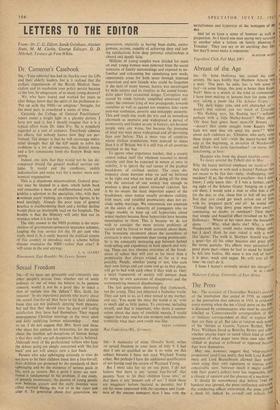Sexual Freedom
Sts,-11 we must spy pruriently and constantly into other people's private lives, whether out of senile jealousy or out of what we believe to, be genuine concern, would it not be a good idea to inject a shot of realism into the 'debate'? Mrs. Scott, for instance: In my experience parents who worry about the sexual free-for-all they have to let their children loose into are not jealously denying them pleasure, but sad that they should miss the deep and lasting satisfaction they have had themselves. They regard monogamous Christian marriage as the most adult and fully satisfying human relationship . . .' And so on. I do not suggest that Mrs. Scott and those who share her attitude arc hypocrites, for the point about the limitless self-deceptions of human beings is that they really are self-deceptions; that is, believed. Although most of the professional writers who keep the debate going are simply concerned with 'the fast buck' and sex will always turn a fast buck.
Parents who take upbringing seriously in time do not have to let their children loose into a free-for-all; their children are protected by the standards of their upbringing and by the existence of serious goals in life, such as careers. But a point I never see men- tioned is fundamental to the problem, if one exists, of juvenile promiscuity; the parents of young people now between sixteen and the early twenties were either married during the war or in the years just after it. To generalise about that generation, my
generation, implicitly as having been stable, mono- gamous, serious, capable of achieving deep and last- ing satisfactions from deep personal relationships is absurd and deeply false.
Millions of young couples were divided for years on end; young women were removed from the social restraints of family surroundings and exposed to un- familiar and exhausting but stimulating new work; opportunity arose for both sexes through imposed separation and new friends who could be forgotten in the next of many moves; licence was encouraged by male society and its rivalries in the armed forces; quite apart from occasional danger. Corruption was caused by crude hatreds; simplified emotional atti- tudes; the constant lying of war propaganda, towards ourselves as well as against our enemies; later came post-war confusion, poverty and unhapppy austerity. This and much else made the war and its immediate aftermath as intensive and widespread a period of promiscuity and licence as any in history; not because people were any worse, but because the pressures of total war were more widespread and all-pervading than ever before. This is more true of countries whose civilian populations were reduced to chaos than it is of Britain, but it is still true of all countries involved in the war.
To ignore what experience teaches, that a society cannot reduce itself (for whatever reasons) to moral anarchy and then be expected to return at once to stability, is to ignore the real causes of the gradual breakdown of civilised society. The crass dis- crepancy alone between what we said we believed to be right and what we were all doing all the time with the sanction of our society was enough to produce a deep and almost universal cynicism. Sex is by no means the most important aspect of the breakdown, since nature usually produces stability with years. and youthful promiscuity does not ex- clude stable marriage. We concentrate our attention on the antics of a minority of youngsters who no longer trouble to keep up old hypocrisies about sexual matters because those hypocrisies have become meaningless to them. This is because we do not wish to consider the more serious problems of society and be forced to think seriously about them. The increasing unconcern about the sacredness of contracts is more important than young promiscuity. So is the constantly increasing gap between faetual truth-telling and expediency in both speech and writ- ing. These are two obvious outcomes of the break- down of values that will cost us far more than a promiscuity that always existed as far as it was possible. People, whether young or not, who earn their own livings and can come and go as they please, will go to bed with each other if they wish to. Only a strict framework of society will prevent them by using its own sanctions of disapproval and -the accompanying material disadvantages.
The last generations destroyed that framework, not the young. They just inherited a frameless world. They can turn to us, as I once turned to my mother, and say, 'You made the mess the world is in,' with as much and as little justice. To everyone, including myself, and that is important, who starts a conver- sation about the state of youthful morals, 1 would suggest that they stop for one moment and remember truthfully what their own youth was like.














































 Previous page
Previous page